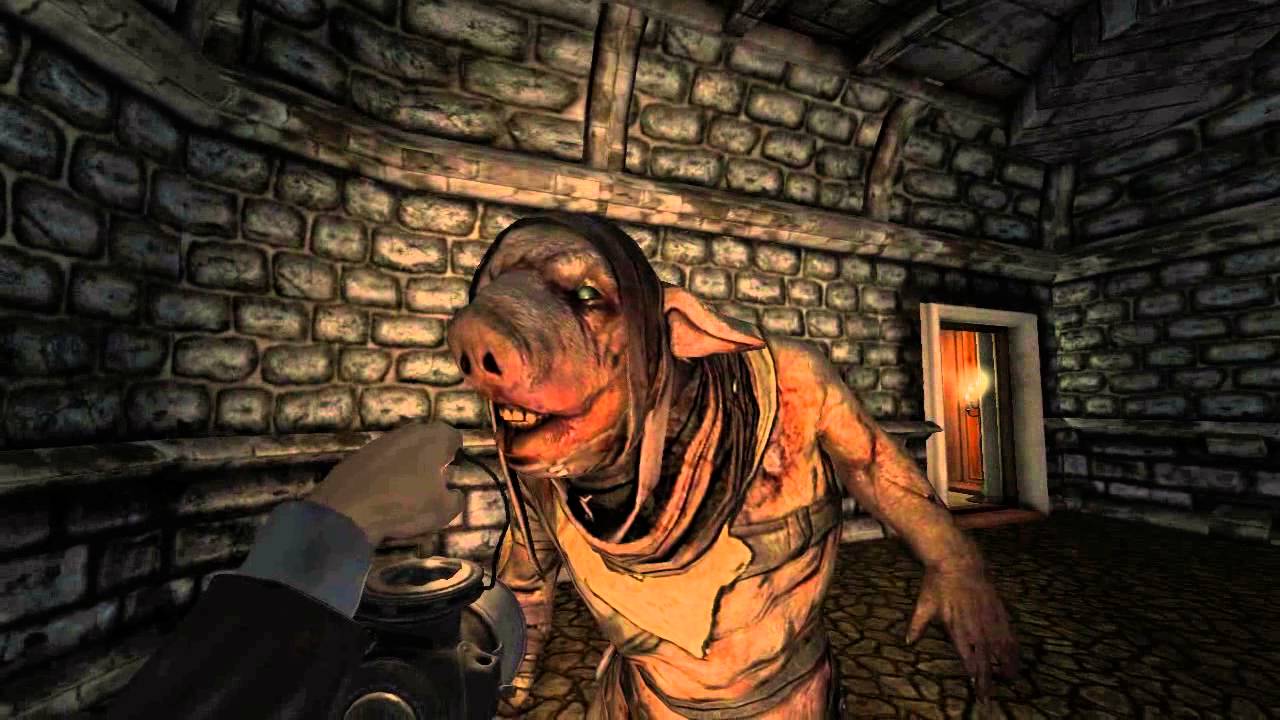Amnesia: A Machine for Pigs
Amnesia: A Machine for Pigs is a survival horror video game developed by The Chinese Room and published by Frictional Games. Originally meant to be a mod by The Chinese Room, the game is an indirect sequel to Amnesia: The Dark Descent, which was both developed and produced by Frictional Games. While set in the same universe as the previous game, it features an entirely new cast of characters and time setting. The game became available to pre-order on 16 August 2013, and was released on 10 September 2013 to mixed reviews from critics. A Machine for Pigs was also released on 22 November 2016 for the PlayStation 4 as part of the Amnesia Collection, including Amnesia: The Dark Descent and its Amnesia: Justine expansion. The game is a survival horror game played from a first-person perspective. Players explore the environments using a lantern, with diary entries and notes providing information on the lost memory of the title character. While the core of the game remains the same between the two, some elements of The Dark Descent have been removed for A Machine for Pigs, while new elements have been added, one reason being to provide a fresh gameplay experience to players of The Dark Descent. The inventory has been removed, along with the oil and tinderboxes. Most of the puzzles that occur in the game are based on physically interacting with the environment because of this change. The sanity mechanic of the first game has been removed as well, meaning that the darkness and looking at the creatures no longer causes any drawbacks. Health lost when Mandus is injured, will regenerate after a certain period of time; thereby eliminating the need to find vials of laudanum to restore health as in The Dark Descent. The game's level design has been touted as "significantly different" from that of The Dark Descent, with larger areas and outdoor environments included. AI was also adjusted to ensure players are unable to predict enemy behavior based on their experiences with the original game.
Amnesia: A Machine for Pigs
Worldwide
2.99€
4.99€ 40% OFF
You may also like these games
Game description
Amnesia: A Machine for Pigs is a survival horror video game developed by The Chinese Room and published by Frictional Games. Originally meant to be a mod by The Chinese Room, the game is an indirect sequel to Amnesia: The Dark Descent, which was both developed and produced by Frictional Games. While set in the same universe as the previous game, it features an entirely new cast of characters and time setting. The game became available to pre-order on 16 August 2013, and was released on 10 September 2013 to mixed reviews from critics. A Machine for Pigs was also released on 22 November 2016 for the PlayStation 4 as part of the Amnesia Collection, including Amnesia: The Dark Descent and its Amnesia: Justine expansion. The game is a survival horror game played from a first-person perspective. Players explore the environments using a lantern, with diary entries and notes providing information on the lost memory of the title character. While the core of the game remains the same between the two, some elements of The Dark Descent have been removed for A Machine for Pigs, while new elements have been added, one reason being to provide a fresh gameplay experience to players of The Dark Descent. The inventory has been removed, along with the oil and tinderboxes. Most of the puzzles that occur in the game are based on physically interacting with the environment because of this change. The sanity mechanic of the first game has been removed as well, meaning that the darkness and looking at the creatures no longer causes any drawbacks. Health lost when Mandus is injured, will regenerate after a certain period of time; thereby eliminating the need to find vials of laudanum to restore health as in The Dark Descent. The game's level design has been touted as "significantly different" from that of The Dark Descent, with larger areas and outdoor environments included. AI was also adjusted to ensure players are unable to predict enemy behavior based on their experiences with the original game.


